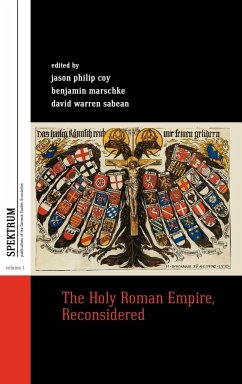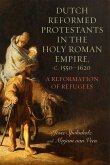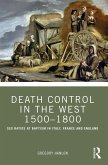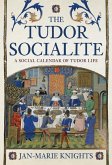The Holy Roman Empire, Reconsidered
Herausgeber: Coy, Jason Philip; Sabean, David Warren; Marschke, Benjamin
The Holy Roman Empire, Reconsidered
Herausgeber: Coy, Jason Philip; Sabean, David Warren; Marschke, Benjamin
- Gebundenes Buch
- Merkliste
- Auf die Merkliste
- Bewerten Bewerten
- Teilen
- Produkt teilen
- Produkterinnerung
- Produkterinnerung
The Holy Roman Empire has often been anachronistically assumed to have been defunct long before it was actually dissolved at the beginning of the nineteenth century. The authors of this volume reconsider the significance of the Empire in the sixteenth, seventeenth, and eighteenth centuries.
Andere Kunden interessierten sich auch für
![Dutch Reformed Protestants in the Holy Roman Empire, C.1550-1620 Dutch Reformed Protestants in the Holy Roman Empire, C.1550-1620]() Dr Mirjam van VeenDutch Reformed Protestants in the Holy Roman Empire, C.1550-162047,99 €
Dr Mirjam van VeenDutch Reformed Protestants in the Holy Roman Empire, C.1550-162047,99 €![The Oxford Illustrated History of Britain The Oxford Illustrated History of Britain]() Kenneth O. MorganThe Oxford Illustrated History of Britain26,99 €
Kenneth O. MorganThe Oxford Illustrated History of Britain26,99 €![1520: The Field of the Cloth of Gold 1520: The Field of the Cloth of Gold]() Amy Licence1520: The Field of the Cloth of Gold23,99 €
Amy Licence1520: The Field of the Cloth of Gold23,99 €![The Battle of Pinkie, 1547 The Battle of Pinkie, 1547]() David CaldwellThe Battle of Pinkie, 154744,99 €
David CaldwellThe Battle of Pinkie, 154744,99 €![Death Control in the West 1500-1800 Death Control in the West 1500-1800]() Gregory HanlonDeath Control in the West 1500-180041,99 €
Gregory HanlonDeath Control in the West 1500-180041,99 €![The Brandon Men The Brandon Men]() Sarah BrysonThe Brandon Men23,99 €
Sarah BrysonThe Brandon Men23,99 €![The Tudor Socialite The Tudor Socialite]() Jan-Marie KnightsThe Tudor Socialite23,99 €
Jan-Marie KnightsThe Tudor Socialite23,99 €-
-
-
The Holy Roman Empire has often been anachronistically assumed to have been defunct long before it was actually dissolved at the beginning of the nineteenth century. The authors of this volume reconsider the significance of the Empire in the sixteenth, seventeenth, and eighteenth centuries.
Hinweis: Dieser Artikel kann nur an eine deutsche Lieferadresse ausgeliefert werden.
Hinweis: Dieser Artikel kann nur an eine deutsche Lieferadresse ausgeliefert werden.
Produktdetails
- Produktdetails
- Spektrum: Publications of the German Studies Association
- Verlag: Berghahn Books
- Seitenzahl: 348
- Erscheinungstermin: 12. Oktober 2010
- Englisch
- Abmessung: 240mm x 161mm x 23mm
- Gewicht: 688g
- ISBN-13: 9781845457594
- ISBN-10: 1845457595
- Artikelnr.: 30191780
- Herstellerkennzeichnung
- Libri GmbH
- Europaallee 1
- 36244 Bad Hersfeld
- gpsr@libri.de
- Spektrum: Publications of the German Studies Association
- Verlag: Berghahn Books
- Seitenzahl: 348
- Erscheinungstermin: 12. Oktober 2010
- Englisch
- Abmessung: 240mm x 161mm x 23mm
- Gewicht: 688g
- ISBN-13: 9781845457594
- ISBN-10: 1845457595
- Artikelnr.: 30191780
- Herstellerkennzeichnung
- Libri GmbH
- Europaallee 1
- 36244 Bad Hersfeld
- gpsr@libri.de
Jason Philip Coy is an Associate Professor of History at the College of Charleston, in Charleston, South Carolina. He has received a DAAD Research Grant and a Maria Sibylla Merian Fellowship for Postdoctoral Studies from the University of Erfurt, Germany. He is the author of Strangers and Misfits: Banishment, Social Control, and Authority in Early Modern Germany (2008).
List of Illustrations
Series Preface
Volume Preface
List of Contributors
Introduction: The Holy Roman Empire in History and Historiography
Jason Coy
SECTION I: PRESENCE, PERFORMANCE, AND TEXT
Chapter 1. Discontinuities: Political Transformation, Media Change, and the
City in the Holy Roman Empire from the Fifteenth to Seventeenth Centuries
Philip Hoffmann-Rehnitz
Chapter 2. Overloaded Interaction: Effects of the Growing Use of Writing in
German Imperial Cities, 1500-1800
Alexander Schlaak
Chapter 3. Princes' Power, Aristocratic Norms, and Personal Eccentricities:
Le Caractère Bizarre of Frederick William I of Prussia (1713-1740)
Benjamin Marschke
SECTION II: SYMBOLIC MEANING, IDENTITY, AND MEMORY
Chapter 4. The Illuminated Reich: Memory, Crisis, and the Visibility of
Monarchy in Late Medieval Germany
Len Scales
Chapter 5. The Production of Knowledge about Confessions: Witnesses and
their Testimonies about Normative Years in and after the Thirty Years' War
Ralf-Peter Fuchs
Chapter 6. Staging Individual Rank and Corporate Identity: Pre-Modern
Nobilities in Provincial Politics
Elizabeth Harding
7. The Importance of Being Seated: Ceremonial Conflict in Territorial Diets
Tim Neu
SECTION III: CEREMONY, PROCEDURE, AND LEGITIMATION
Chapter 8. Ceremony and Dissent: Religion, Procedural Conflicts, and the
"Fiction of Consensus" in Seventeenth-Century Germany
David M. Luebke
Chapter 9. Contested Bodies: Schwäbisch Hall and its Neighbors in Conflicts
Regarding High Jurisdiction (1550-1800)
Patrick Oelze
Chapter 10. Conflict and Consensus around German Princes' Unequal
Marriages: Prince's Autonomy, Emperor's Intervention, and the
Juridification of Dynastic Politics
Michael Sikora
Chapter 11. Power and Good Governance: The Removal of Ruling Princes in the
Holy Roman Empire, 1680-1794
Werner Trossbach
SECTION IV: IMPERIAL INSTITUTIONS, CONFESSION, AND POWER RELATIONS
Chapter 12. Marital Affairs as a Public Matter within the Holy Roman
Empire: The Case of Duke Ulrich and Duchess Sabine of Württemberg at the
Beginning of the Sixteenth Century
Michaela Hohkamp
Chapter 13. The Corpus Evangelicorum: A Culturalist Perspective on its
Procedure in the Eighteenth-Century Holy Roman Empire
Andreas Kalipke
Chapter 14. Gallican Longings: Church and Nation in Eighteenth-Century
Germany
Michael Printy
Conclusion: New Directions in the Study of the Holy Roman Empire - A
Cultural Approach
André Krischer
Glossary
Bibliography
Index
Series Preface
Volume Preface
List of Contributors
Introduction: The Holy Roman Empire in History and Historiography
Jason Coy
SECTION I: PRESENCE, PERFORMANCE, AND TEXT
Chapter 1. Discontinuities: Political Transformation, Media Change, and the
City in the Holy Roman Empire from the Fifteenth to Seventeenth Centuries
Philip Hoffmann-Rehnitz
Chapter 2. Overloaded Interaction: Effects of the Growing Use of Writing in
German Imperial Cities, 1500-1800
Alexander Schlaak
Chapter 3. Princes' Power, Aristocratic Norms, and Personal Eccentricities:
Le Caractère Bizarre of Frederick William I of Prussia (1713-1740)
Benjamin Marschke
SECTION II: SYMBOLIC MEANING, IDENTITY, AND MEMORY
Chapter 4. The Illuminated Reich: Memory, Crisis, and the Visibility of
Monarchy in Late Medieval Germany
Len Scales
Chapter 5. The Production of Knowledge about Confessions: Witnesses and
their Testimonies about Normative Years in and after the Thirty Years' War
Ralf-Peter Fuchs
Chapter 6. Staging Individual Rank and Corporate Identity: Pre-Modern
Nobilities in Provincial Politics
Elizabeth Harding
7. The Importance of Being Seated: Ceremonial Conflict in Territorial Diets
Tim Neu
SECTION III: CEREMONY, PROCEDURE, AND LEGITIMATION
Chapter 8. Ceremony and Dissent: Religion, Procedural Conflicts, and the
"Fiction of Consensus" in Seventeenth-Century Germany
David M. Luebke
Chapter 9. Contested Bodies: Schwäbisch Hall and its Neighbors in Conflicts
Regarding High Jurisdiction (1550-1800)
Patrick Oelze
Chapter 10. Conflict and Consensus around German Princes' Unequal
Marriages: Prince's Autonomy, Emperor's Intervention, and the
Juridification of Dynastic Politics
Michael Sikora
Chapter 11. Power and Good Governance: The Removal of Ruling Princes in the
Holy Roman Empire, 1680-1794
Werner Trossbach
SECTION IV: IMPERIAL INSTITUTIONS, CONFESSION, AND POWER RELATIONS
Chapter 12. Marital Affairs as a Public Matter within the Holy Roman
Empire: The Case of Duke Ulrich and Duchess Sabine of Württemberg at the
Beginning of the Sixteenth Century
Michaela Hohkamp
Chapter 13. The Corpus Evangelicorum: A Culturalist Perspective on its
Procedure in the Eighteenth-Century Holy Roman Empire
Andreas Kalipke
Chapter 14. Gallican Longings: Church and Nation in Eighteenth-Century
Germany
Michael Printy
Conclusion: New Directions in the Study of the Holy Roman Empire - A
Cultural Approach
André Krischer
Glossary
Bibliography
Index
List of Illustrations
Series Preface
Volume Preface
List of Contributors
Introduction: The Holy Roman Empire in History and Historiography
Jason Coy
SECTION I: PRESENCE, PERFORMANCE, AND TEXT
Chapter 1. Discontinuities: Political Transformation, Media Change, and the
City in the Holy Roman Empire from the Fifteenth to Seventeenth Centuries
Philip Hoffmann-Rehnitz
Chapter 2. Overloaded Interaction: Effects of the Growing Use of Writing in
German Imperial Cities, 1500-1800
Alexander Schlaak
Chapter 3. Princes' Power, Aristocratic Norms, and Personal Eccentricities:
Le Caractère Bizarre of Frederick William I of Prussia (1713-1740)
Benjamin Marschke
SECTION II: SYMBOLIC MEANING, IDENTITY, AND MEMORY
Chapter 4. The Illuminated Reich: Memory, Crisis, and the Visibility of
Monarchy in Late Medieval Germany
Len Scales
Chapter 5. The Production of Knowledge about Confessions: Witnesses and
their Testimonies about Normative Years in and after the Thirty Years' War
Ralf-Peter Fuchs
Chapter 6. Staging Individual Rank and Corporate Identity: Pre-Modern
Nobilities in Provincial Politics
Elizabeth Harding
7. The Importance of Being Seated: Ceremonial Conflict in Territorial Diets
Tim Neu
SECTION III: CEREMONY, PROCEDURE, AND LEGITIMATION
Chapter 8. Ceremony and Dissent: Religion, Procedural Conflicts, and the
"Fiction of Consensus" in Seventeenth-Century Germany
David M. Luebke
Chapter 9. Contested Bodies: Schwäbisch Hall and its Neighbors in Conflicts
Regarding High Jurisdiction (1550-1800)
Patrick Oelze
Chapter 10. Conflict and Consensus around German Princes' Unequal
Marriages: Prince's Autonomy, Emperor's Intervention, and the
Juridification of Dynastic Politics
Michael Sikora
Chapter 11. Power and Good Governance: The Removal of Ruling Princes in the
Holy Roman Empire, 1680-1794
Werner Trossbach
SECTION IV: IMPERIAL INSTITUTIONS, CONFESSION, AND POWER RELATIONS
Chapter 12. Marital Affairs as a Public Matter within the Holy Roman
Empire: The Case of Duke Ulrich and Duchess Sabine of Württemberg at the
Beginning of the Sixteenth Century
Michaela Hohkamp
Chapter 13. The Corpus Evangelicorum: A Culturalist Perspective on its
Procedure in the Eighteenth-Century Holy Roman Empire
Andreas Kalipke
Chapter 14. Gallican Longings: Church and Nation in Eighteenth-Century
Germany
Michael Printy
Conclusion: New Directions in the Study of the Holy Roman Empire - A
Cultural Approach
André Krischer
Glossary
Bibliography
Index
Series Preface
Volume Preface
List of Contributors
Introduction: The Holy Roman Empire in History and Historiography
Jason Coy
SECTION I: PRESENCE, PERFORMANCE, AND TEXT
Chapter 1. Discontinuities: Political Transformation, Media Change, and the
City in the Holy Roman Empire from the Fifteenth to Seventeenth Centuries
Philip Hoffmann-Rehnitz
Chapter 2. Overloaded Interaction: Effects of the Growing Use of Writing in
German Imperial Cities, 1500-1800
Alexander Schlaak
Chapter 3. Princes' Power, Aristocratic Norms, and Personal Eccentricities:
Le Caractère Bizarre of Frederick William I of Prussia (1713-1740)
Benjamin Marschke
SECTION II: SYMBOLIC MEANING, IDENTITY, AND MEMORY
Chapter 4. The Illuminated Reich: Memory, Crisis, and the Visibility of
Monarchy in Late Medieval Germany
Len Scales
Chapter 5. The Production of Knowledge about Confessions: Witnesses and
their Testimonies about Normative Years in and after the Thirty Years' War
Ralf-Peter Fuchs
Chapter 6. Staging Individual Rank and Corporate Identity: Pre-Modern
Nobilities in Provincial Politics
Elizabeth Harding
7. The Importance of Being Seated: Ceremonial Conflict in Territorial Diets
Tim Neu
SECTION III: CEREMONY, PROCEDURE, AND LEGITIMATION
Chapter 8. Ceremony and Dissent: Religion, Procedural Conflicts, and the
"Fiction of Consensus" in Seventeenth-Century Germany
David M. Luebke
Chapter 9. Contested Bodies: Schwäbisch Hall and its Neighbors in Conflicts
Regarding High Jurisdiction (1550-1800)
Patrick Oelze
Chapter 10. Conflict and Consensus around German Princes' Unequal
Marriages: Prince's Autonomy, Emperor's Intervention, and the
Juridification of Dynastic Politics
Michael Sikora
Chapter 11. Power and Good Governance: The Removal of Ruling Princes in the
Holy Roman Empire, 1680-1794
Werner Trossbach
SECTION IV: IMPERIAL INSTITUTIONS, CONFESSION, AND POWER RELATIONS
Chapter 12. Marital Affairs as a Public Matter within the Holy Roman
Empire: The Case of Duke Ulrich and Duchess Sabine of Württemberg at the
Beginning of the Sixteenth Century
Michaela Hohkamp
Chapter 13. The Corpus Evangelicorum: A Culturalist Perspective on its
Procedure in the Eighteenth-Century Holy Roman Empire
Andreas Kalipke
Chapter 14. Gallican Longings: Church and Nation in Eighteenth-Century
Germany
Michael Printy
Conclusion: New Directions in the Study of the Holy Roman Empire - A
Cultural Approach
André Krischer
Glossary
Bibliography
Index








